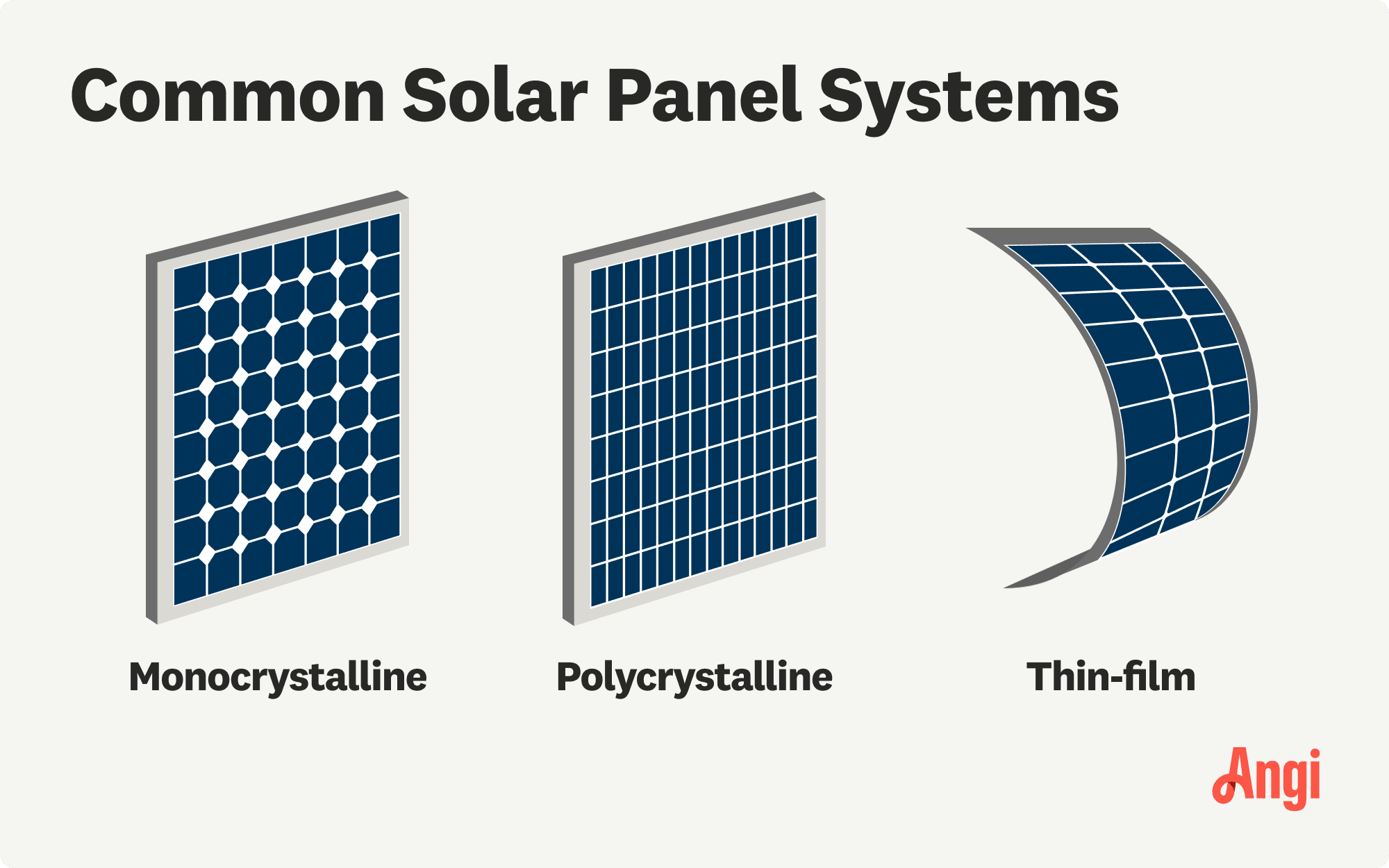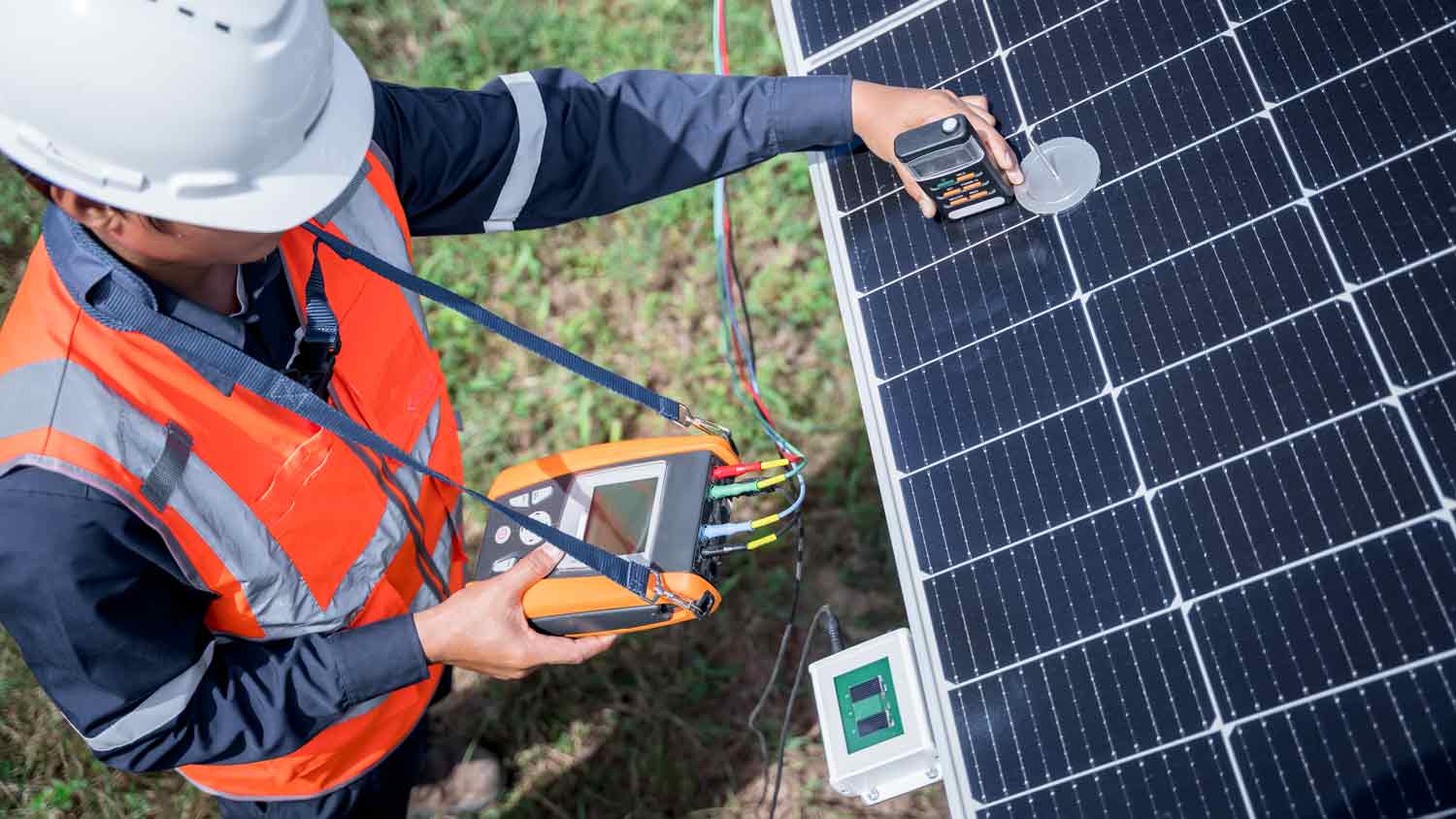
Solar battery costs depend on the size of your system, labor, and capacity. Learn how much you could pay for batteries for home solar systems.
Solar panel service costs depend on your project and location. Check with a local pro for your specific job.
The best-performing solar panels for the weather in Phoenix are monocrystalline, but thin-film panels are cost-effective for large installations.
Solar installations increase your home's value in Phoenix, and it's an expected amenity for modern homebuyers.
In Phoenix, where net metering is no longer available in lieu of net billing, homeowners receive credits for excess power generated by new solar systems at a rate below retail.
Phoenix is one of the sunniest cities in the U.S., making solar panels an easy choice for many homeowners. Although residents enjoy an average cost of living, solar panel installation costs in Phoenix are about 12% higher than the national average. Costs range from $20,708 to $40,444, with an average of $30,501. From your system’s size, panel type, local incentives, and more, discover how much you can expect to pay for your solar panel installation.
These are the most significant cost factors to consider when getting ready for a solar panel installation in Phoenix, Arizona.
The size of the solar system will impact your solar panel installation costs. The larger the output, the more you’ll pay. Most homes need 6- to 10-kW (kilowatt) systems, which work out to anywhere from 15 to 34 panels, depending on the wattage.
The table below shows average costs based on the size of your solar system:
| Solar System Size (kW) | Average Cost |
|---|---|
| 5 | $13,950–$19,500 |
| 6 | $16,725–$23,425 |
| 7 | $19,500–$27,325 |
| 8 | $19,625–$31,225 |
| 9 | $25,100–$35,125 |
| 10 | $27,875–$39,025 |
| 11 | $30,675–$42,950 |
| 12 | $33,450–$46,825 |

When choosing the type of solar panel that works best for your home, consider three main factors: efficiency, life expectancy, and design. Here’s how the type of solar panel can affect your cost:
| Type of Solar Panel | Average Cost per Watt | Lifespan (Years) | Pros | Cons |
|---|---|---|---|---|
| Monocrystalline | $1–$1.50 | 40 | Can handle extreme heat | High cost |
| Polycrystalline | $0.90–$1 | 25–30 | More affordable than monocrystalline | Doesn’t work well in high temperatures |
| Thin film | $0.70–$1 | 10–20 | Works well in high temperatures | Short lifespan |
On average, most homes need anywhere from 20 to 25 panels to fully power a home, but this can range from as few as 15 to as many as 34. How many solar panels you need depends on the number of watts per panel, your energy consumption, and the efficiency of your panels. Your average solar panel will have an output of anywhere from 250 to 400 watts. The dimensions of your solar panels will also depend on the power output.
The hardware you need for your solar system will add to your total costs. The more advanced the technology, the higher the up-front cost. The type of mount will affect the cost as well:
Fixed Mounts: $10–$15 per mount
Adjustable Mounts: $50 per mount
Tracking: $500–$3,000 or more per mount (these mounts can self-track sunlight, leading to up to 45% more energy production)
Other materials you will need for a solar energy system include the parts in the table below.
| Hardware | Average Cost |
|---|---|
| String inverter | $1,000–$3,000 each |
| Microinverters | $150–$300 each |
| Power optimizer | $80–$150 each |
| Solar battery | $400–$15,000 |
Inverter and Microinverters: Convert direct current (DC) electricity to alternating current (AC) electricity
Optimizer: Regulates currents so each panel is more energy efficient and prevents power loss.
Battery: Stores excess energy from the system so homeowners can use it at night or during a power outage
Some systems use a single solar inverter or several microinverters that convert DC to AC electricity. Materials like the wiring and battery are often grouped with the package price unless you opt for add-on services.
Hiring an experienced pro to install your solar panels is key to making the most of this exciting new home addition. Budget $0.50 per watt for labor when you hire a solar panel installer in Phoenix, Arizona. This number doesn’t include permits or the cost of additional technology, such as special mounts, tiles, or shingles.
Solar panel installation does require electrical work. Though many solar panel installation companies have a licensed electrician on staff who specializes in solar panels, roofing contractors sometimes subcontract an electrician. The average cost of hiring an electrician is $60 to $120 per hour.
In Maricopa County, the permit fee is $300 for roof-mounted solar systems or $110 to $500 for ground-mounted systems, depending on the height of the panels. Your solar installer will submit the required paperwork, which includes the design and layout of the proposed system, manufacturer’s product information, and more.
Note that Arizona requires solar installers to have a solar contractor certification.
The U.S. Energy Information Administration (EIA) reports that 13% of Arizona’s total electricity net generation comes from solar, so you can see how solar is a common amenity expected by many homebuyers. After all, running the AC for months on end during soaring temperatures means that solar panels help cut down on high energy bills.
Homeowners accustomed to scorching summers won’t be surprised that solar panel installations in Phoenix can increase your home’s value by about 4%, according to a study from Zillow. To enjoy these perks, you’ll need to own the solar panels and not be on a lease or Power Purchase Plan agreement. Note that if your solar panels are getting close to 20 to 30 years old and need to be replaced in the coming years, homebuyers may consider them a liability.
The payback period in Phoenix—how long it takes to recoup the original investment—is six to seven years. Moreover, the return on investment (ROI) for solar panels is approximately 35%.
Once your solar panels are paid off, they're officially your property. If you move, you can reinstall them on a new rooftop. Alternatively, they can increase the value of your home by 3% to 4% and attract more buyers. They can also give your property a competitive edge in a buyers’ market.
The best way to save money on the up-front costs of installing solar panels is to take advantage of the Solar Investment Tax Credit (ITC) before it ends on December 31, 2025. The ITC allows homeowners to claim a federal tax credit equal to 30% of the price of their solar panel system installation.
For example, if your solar panel system costs $30,000 before the federal tax credit, you can save around $9,000. However, to benefit from this credit, your solar system has to be installed and working before the federal incentive ends.
The ITC, also known as the Residential Clean Energy Credit, was originally extended through 2032 as part of the Inflation Reduction Act. However, new federal legislation (the Big Beautiful Bill Act) signed into law on July 4, 2025, terminated the credit early. The Solar Energy Industries Association® (SEIA) outlines the high-level policy changes and restrictions on energy tax credits.
Additionally, the extra power you choose not to store in a battery can be sent back to the grid. Your local utility company will compensate you for that power, but the amount will vary. You can check the Utility Rate Database on Open EI to estimate how much you can expect to receive for generating excess energy.
You may qualify for incentives through the state of Arizona, including:
Arizona Solar Sales Tax Exemption: You won’t be charged sales tax if you purchase eligible solar equipment and installations through a registered seller or contractor.
Energy Equipment Property Tax Exemption: Property tax assessments will exclude the added home value from a solar panel installation.
Arizona’s Solar Energy Credit: This incentive provides a Credit for Solar Energy Devices toward your income tax equal to 25% of the cost of purchasing and installing solar panels (up to $1,000).
Arizona no longer has a net metering program, but solar owners can earn benefits for the extra electricity their panels produce. The difference is that you get a credit based on the retail price of electricity for net metering programs, whereas net billing only offers a wholesale rate. The rates range between $0.057 and $0.069 per kWh, depending on which electric company you use.
Home is the most important place on earth, which is why Angi has helped more than 150 million homeowners transform their houses into homes they adore. To help homeowners with their next project, Angi provides readers with the most accurate cost data and upholds strict editorial standards. We survey real Angi customers about their project costs to develop the pricing data you see, so you can make the best decisions for you and your home. We pair this data with research from reputable sources, including the U.S. Bureau of Labor Statistics, academic journals, market studies, and interviews with industry experts—all to ensure our prices reflect real-world projects.
Want to help us improve our cost data? Send us a recent project quote to [email protected]. Quotes and personal information will not be shared publicly.
From average costs to expert advice, get all the answers you need to get your job done.

Solar battery costs depend on the size of your system, labor, and capacity. Learn how much you could pay for batteries for home solar systems.

There are a few factors to consider when it comes to solar panel repair costs. This guide breaks down the prices of solar panel removal, repair, and replacement.

Discover the average solar panel inspection cost, what impacts pricing, and how to save. Get expert tips to keep your solar system efficient and safe.

Thinking about switching to solar? Consider the pros and cons of solar energy to decide if it’s right for you. We shine a light on the upsides and downsides.

Most solar panel installations require a pro, but you can still learn how to install solar panels. Read this guide to install solar panels like a pro.

Are you wondering why your solar panels aren’t working? Here are the reasons why your solar panel system isn’t providing power like it should.